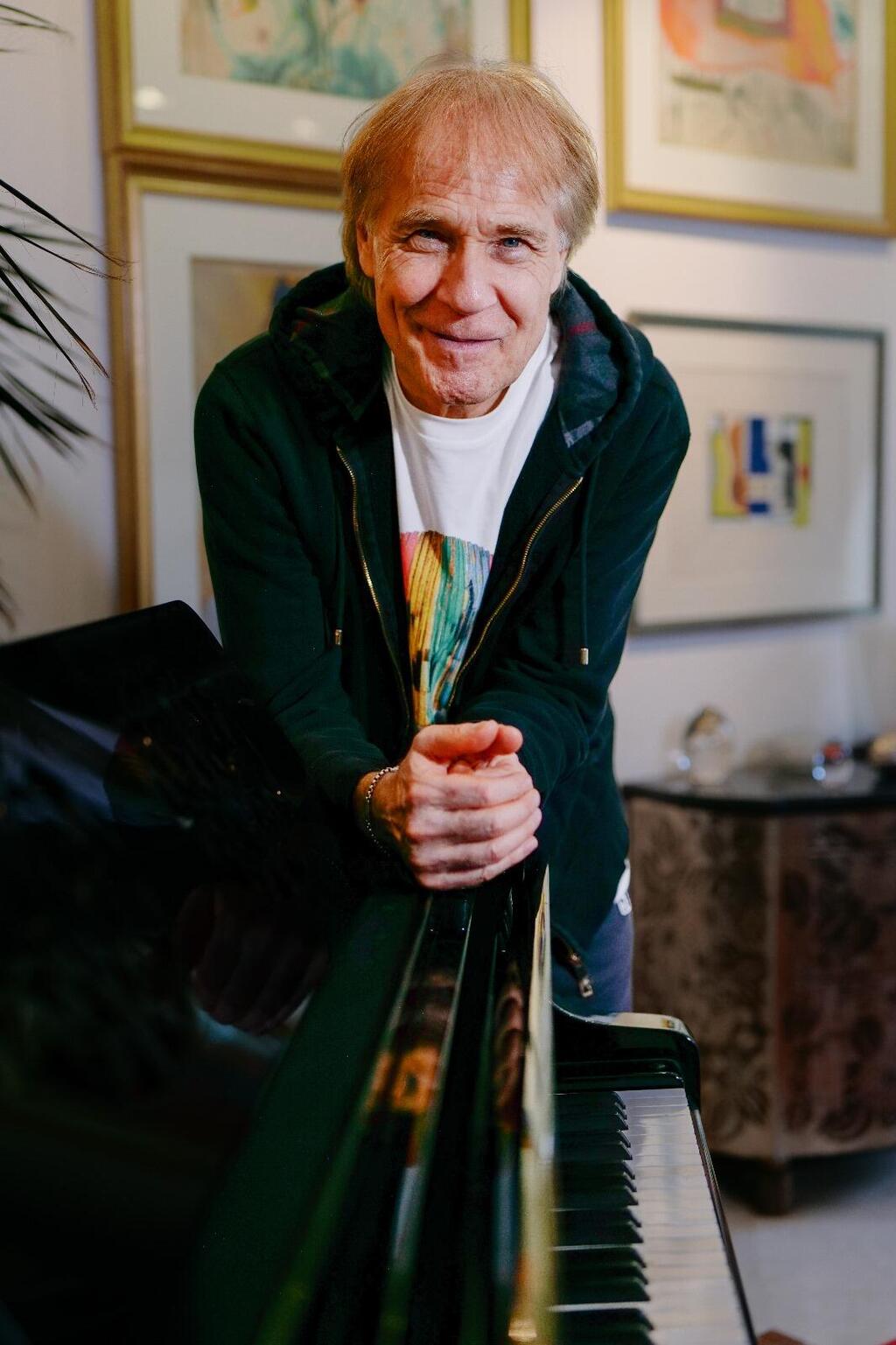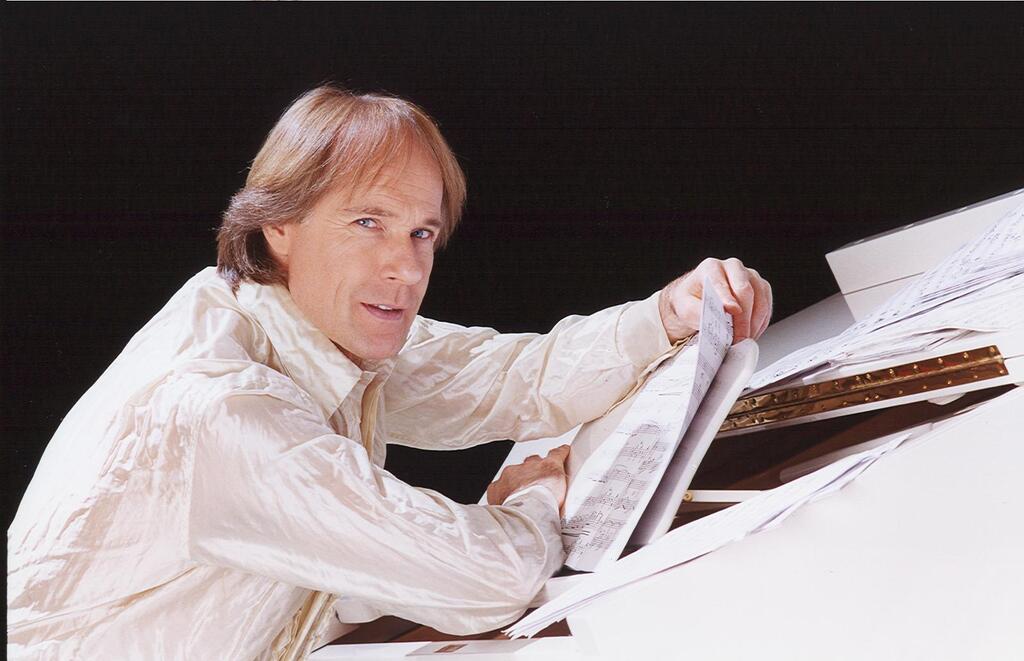It’s no secret that bringing major artists to perform in Israel is complicated. It was difficult even before the war broke out, and it has become exponentially harder during it. While we may not see Bruno Mars or Guns N’ Roses returning to Yarkon Park anytime soon, there are those who choose to set aside all the background noise and come to perform in Israel despite everything.
“Like all French people, I am very concerned about what is happening in Israel right now,” says the successful pianist Richard Clayderman in an interview held in Paris ahead of his upcoming performance in Israel. “It’s terrible that a country is going through what you’ve experienced and dealing with the loss of so many lives. I was surprised to be invited to perform in Israel despite all the challenges you are facing, but I want to bring with me a message of love and peace.”
You have fans all over the world, and not all of them necessarily support Israel. Aren’t you worried about the reactions?
“I don’t think about it. There may be people who are unhappy about it, but it doesn’t matter to me,” according to Clayerman.
“I’ll tell you a story,” adds his manager, Olivier Toussaint. “Richard performed in Iran in the past in a series of six concerts, and it was a great success. Afterward, he traveled to Israel, and there were those in Iran who told him it wasn’t a good idea to go. When he heard that, he replied, ‘I come to play for the people in your country, and if I’m invited to Israel, I’ll go there too.’ And they accepted it.”
Did you ever think, even for a moment, that it might be too dangerous to come?
“Every time I’ve come, it’s been good. There were beautiful moments, and everything was fine. I hope the audience will come this time as well. Many people feel better when they listen to my music, and I hope that will happen again now,” he says in response to a question about whether music has the power to bridge between nations and people. “Many times, people approach me and tell me they find comfort in my music — it’s very moving for me. You can get through many difficult moments with the help of music.”
When you come to Israel, do you have time to travel around?
“Yes, I’ve toured Jerusalem and Tel Aviv. Israel is a country with many exciting places, and I feel that when I’m there. I love seeing the cities and the architecture. But my main goal when I’m in Israel is to give the best performance I can.
“Every time I’ve performed in Israel, the audience has received me with great respect. It seems they know my music, love it and enjoy it. There’s always a pleasant atmosphere and positive energy. I try to play with all my heart and give my all. I always put in my best efforts when performing in Israel because I feel the audience connects to my style of playing, and it excites me to play for them.”
Clayderman, 71, is set to perform at the Tel Aviv Culture Hall on April 6, accompanied by the Ra’anana Symphonette Orchestra. For several decades, out of a career spanning nearly 50 years, he has been coming to Israel every few years to perform.
“I will perform some of my original compositions as well as many romantic pieces I’ve arranged in my style,” he says in describing the upcoming concert, five years after his last one. “There will also be musicians from Israel with me, and I’m happy to share my music and performance with them. From time to time, I’ll also perform more rhythmic pieces, and the evening will be accompanied by video works. I think it will be a good show for the audience — I haven’t visited Israel in a few years, and I’m very happy to return soon.”
The musician, born Philippe Pagès, began playing as a child thanks to his father, who was a piano teacher. He started his career accompanying other major musicians, including Johnny Hallyday. Gradually, and thanks to numbers like “Ballade pour Adeline,” “A Comme Amour,” or his renditions of classics like Beethoven’s “Für Elise,” Clayderman popularized the romantic and instrumental piano genre worldwide and made piano studies more appealing.
“When I started playing the piano, I was five or six years old. My father was a piano teacher, and we had one at home,” he recalls during the conversation, held at Toussaint’s home. Toussaint helps translate some of Clayderman’s sentences, as, like a true Frenchman, his English isn’t fluent. “Later, my father taught me many lessons and gave me a lot of advice. Every year that passed, I was so happy to sit at my piano and play. I remember that, when I was 15 or 16, it was pure joy for me to play with other musicians and perform pieces I heard on the radio. Later, I became a pianist accompanying French pop stars, and then I got the opportunity to record my first album with Olivier and Paul de Senneville.”
Did you ever think you’d become famous?
“Never. It happened thanks to Olivier and Paul and thanks to ‘Ballade pour Adeline,’ which became a huge success just months after its recording. Thanks to that, I was able to play all over the world. That ballad touched people. The melody itself isn’t very complicated musically, but it manages to go straight to the heart. It’s a combination of popular and classical music, and it was something new at the time.”
“Paul and I decided to hold auditions for different pianists,” Toussaint recalls their first meeting when they were looking for a musician to record the famous ballad de Senneville composed for his daughter Adeline’s birthday. “Clayderman came, and I didn’t know him before — but he immediately won me over. I asked him if he’d agree to record, and he said yes. That’s how he was chosen from among several other pianists who came to that audition.”
As Clayderman himself describes, “Ballade pour Adeline” quickly launched his career — but not before they realized that to succeed outside of France Philippe Pagès needed a more international-sounding name. “It’s his fault!” Clayderman jokingly accuses his manager. “Back then, it was very common for artists to change their names, and when we thought about a name, I remembered that my great-great-grandfather’s name was Kleiman, and that’s how we got to Clayderman — it sounded good. But on official documents or my passport, I’m always Philippe. Even in my family, they still call me Philippe or Pipi.”
Clayderman has already established his place in the world, but in today’s reality of ever-changing music and artificial intelligence, it’s not a given to continue performing at events centered solely on piano music—without any lyrics to his songs. “I’ve heard recordings created by artificial intelligence, but I believe that creators, composers and performers will remain unique. I don’t think artificial intelligence will take over the music world anytime soon,” he asserts.
How do you manage to reach new and younger audiences in an era of pop and digital music?
“In many countries, I see a lot of parents and children coming together to my concerts to listen to my music. Many children come to see me, and after the concert they want to start learning piano. It excites me to know I can influence them and that there are young musicians learning to play with the help of my music.
Get the Ynetnews app on your smartphone: Google Play: https://bit.ly/4eJ37pE | Apple App Store: https://bit.ly/3ZL7iNv
“I’m not a singer, and I really focus solely on instrumental music. But I try to share my emotions with the audience, and the most important thing for me is to have a good piano. When I have a good piano, I feel good. Even without words, I believe — and I hope — that my playing and the arrangements I perform manage to convey feelings, just like words. I share my music in Israel as well as in many other countries around the world. After 45 years of career, I’m still excited to continue doing this.”
Do you have any advice for those young musicians?
“Practice, practice, practice, and practice some more. For example, today, before I came here, I practiced at home for several hours. Every day I have new pieces to learn, and I have to rehearse my repertoire — that’s something I make sure to do every day.”
After so many years of creating, do you still have dreams to fulfill or collaborations you’d like to pursue?
“I’ve collaborated with some singers in France, but it’s not always easy to coordinate between artists. Recently, I was contacted by Chilly Gonzales, a Canadian-French pianist living in Germany. He told me he started playing piano inspired by my music and invited me to participate in recording an album with him. We also performed together at several concerts, including at the Olympia Theater in Paris. It was a very special experience.
“After 45 years of career, my goal is to continue performing for as many years as possible. I do my best to give my best performances, and my dream is to keep playing all over the world—from Latin America to Asia and China. The opportunity to perform in countries all over the world is a gift for me.”



